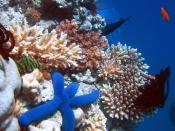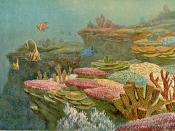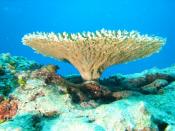A coral reef ecosystem is one of the most biologically diverse areas you could find in the world. Located in the world's tropical oceans, reefs provide an infinite amount of importance to the Earth. Yet before we label this importance, we must look first to the definition of a Coral Reef so we can understand just how they work.
Coral reefs consist of limestone structures that give shelter to about 25 percent of all marine life in the Ocean. Considered one of the largest, most complex ecosystems on the planet, coral reefs are home to 4,000 species of fish, 700 species of coral, and countless amounts of other organisms (The Coral Reef Alliance, 2000). In the oceans, four types of coral reefs exist: the fringing reef, the barrier reef, patch reefs and atolls (Pinet, 2000). Charles Darwin first recorded 3 types of coral reefs on his studies of the Pacific Ocean, since then his theory has been widely accepted.
Fringing reefs are the most common type of reef and develop near the coasts of landmasses. Barrier Reefs are similar to fringing reefs. These reefs run parallel to the coastline, yet deeper water separates them from the shore. The final type of reef is the atoll. Atolls develop in a ringed shape and create protected lagoons in the middle of the ocean (Pinet, 2000). Surprisingly coral reefs have limits on where they can grow. Most coral reefs develop in tropical waters between the Tropic of Cancer and Tropic of Capricorn. They can be found off the coast of 100 different countries worldwide and cover an estimated 600,000 square kilometers. With all of this information we can look at what causes their formation (The Coral Reef Alliance, 2000).
Coral reefs begin to develop in 3 main steps. First hard corals...


